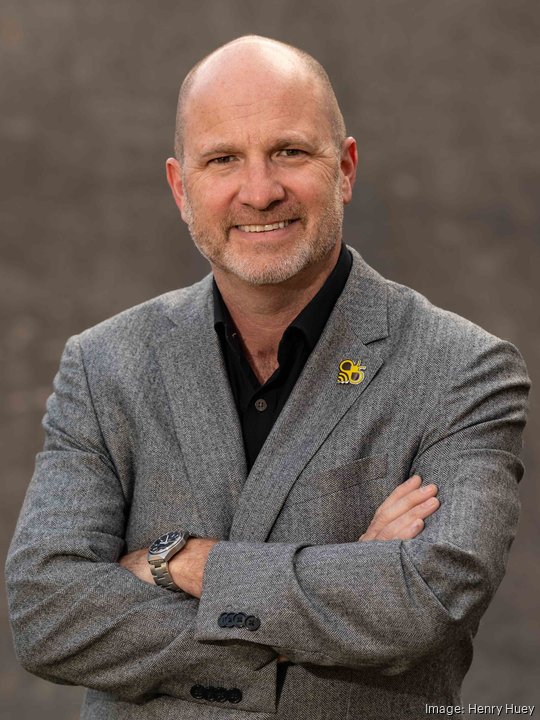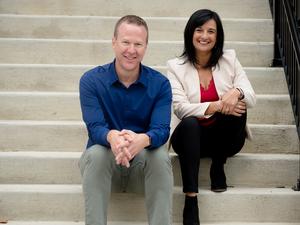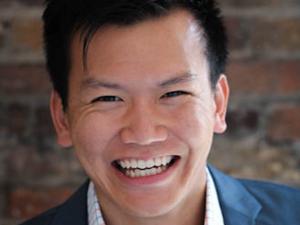
An Austin serial entrepreneur moved his latest startup to Columbus after hiring several leaders who'd worked with him four companies ago at a Dublin health IT firm he led to acquisition.
SigBee Inc. has raised more than $5 million in about two years for employee engagement "check-in" software, founder and CEO Alistair Deakin said.
“We raised the money in almost hours,” Deakin said. “The idea took shape before the pandemic, but the pandemic made it hyper-relevant.
“Great management really requires some in-person time,” he said. “You need the soft signals of how someone is really doing.”
Coalescing in Central Ohio made sense because half the firm's 14 employees are here. Many share roots with Deakin in the former CMHC Systems Inc., acquired by Netcare in 2005.
"It really is putting the band back together," Deakin said in an interview.
Those key hires, just like investors and clients, responded with enthusiasm to the seemingly simple idea, he said: Improve a company's culture and build trust through routine check-ins that don't take much time but provide managers with valuable insight.
Launched in February 2022, the product has landed 16 employers as clients so far. Revenue is not disclosed, but Deakin is aiming for some 100 customers by year's end and subscription revenue that would annualize to $5 million.
Another dynamic in its growth is the growing cohort of Gen Z entering the workforce.
"They're used to checking with each other," he said. "They sort of expect to have a voice."
Austin connection
Deakin lives in Austin, where his most recent companies were based, and SigBee has a presence near a large customer in Boulder, Colorado. The company was incorporated in Nashville because an investor there had provided back-office support.
The first physical office opened last week at 4920 Reed Road, a few blocks north of Upper Arlington.
The idea for SigBee first germinated in his 12 years as CEO of Austin-based KaleidaCare Management Solutions, which made an electronic health record tailored to behavioral health. He invested and joined as CEO in 2007 when the company was in bankruptcy, and turned it to profit in two years, the Austin Business Journal reported. He led it to acquisition in early 2019. (His next two businesses involved consulting.)
Along the way, Deakin observed a challenge in behavioral health: Therapy typically is delivered on a strict schedule, so a lot of a 50-minute session is spent trying to figure out what’s really going on with the patient at that moment.
“The reality of most patient journeys is, some people need more help, more frequently, especially on the days they’re most struggling,” Deakin said.
The startup rolled out an app for daily check-ins and more tailored care with a set of families in Indiana.
“It was tremendously effective,” he said. “Sometimes you’re having good days or bad days. If you could show up for someone on the days they really need it, it can be far more effective.”
Then one of the client agencies said it would work great for supervising case workers, such as preventing burnout. Deakin talked to investors in his previous companies. Many said they would use the tool at their own companies, including large recreation chains and other nationwide organizations.
"It’s changing the way managers connect to their teams and show up for their teams," Deakin said. "It makes managing less stressful: We know what we have to do."
Most employee engagement software tends to analyze anonymized data from varied sources. For example, Columbus-based Aware analyzes sentiment on workforce collaboration platforms.
"What we’re trying to do is build authentic relationships between manager and employee," Deakin said. "It’s the equivalent of what we used to have, a coffee-pot moment."
CMHC connections
Deakin first joined the former CMHC, which made software for behavioral health practices, in a sales role in 2001 to grow market share, according to his LinkedIn profile. In 2003 he was promoted to succeed the founder as CEO.
The company was acquired the in fall 2005 for $18 million in cash and stock by competitor Netsmart Technologies Inc., one of three acquisitions that year. Deakin stayed for one year.
Now based in the Kansas City area, Netsmart no longer has a Dublin office. About 100 employees are in Central Ohio, a spokeswoman confirmed.
Although he moved away, Deakin kept in touch with the leaders who were in the trenches of that turnaround. Some went to other Central Ohio software makers such as Northwoods and Updox.
Michael Littman, now SigBee's finance chief, reached out after reading about the new venture on LinkedIn. Deakin then met with several of his former CMHC team at a conference in Ohio.
"They were ready to quit their jobs and join me," he said. "They strongly wanted to be part of SigBee. What the world needed was healthier workplaces, good bosses, healthy dynamics. (And) they'd liked working with me before."
Even the startup's new landlord, Futurety founder and President Bill Balderaz, worked with them at CMHC for the pivotal nine months leading to the acquisition.
"(CMHC) was a great place to connect with tech leaders, and many of the alumni have gone on to do great things," Balderaz said via email. "The timing in this case was perfect."
He was buying the office condo near Futurety's office when he heard Deakin was looking for space, and the lease was signed a week after closing the sale in April.
Deakin plans to get a local apartment, but his wife leads an Austin medical charity, so the couple aren't moving full-time. Their children went to Dublin high schools, and one son still lives here.
Central Ohio's tech industry has changed dramatically in 17 years, Deakin said, from "one or two players" to "a really robust ecosystem."
"The talent pool is first-rate," he said. "To be honest it feels more manageable – there’s less noise from the mega-employers. In Austin, you start hiring a tech team, and Apple and Google flinch, and they just start hiring your talent.
"I feel really confident that what we need is all around us in Columbus."







